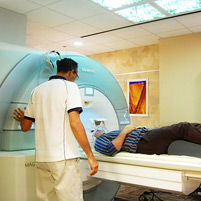Fighting Cancer

Magnetic resonance imaging (MRI) isn't just for capturing detailed images of torn knee ligaments or the brain.
A novel technology developed by Carnegie Mellon University scientist Eric Ahrens will soon allow doctors to use MRI to monitor, in patients, the delivery of vaccine for treating colorectal cancer.
The U.S. Food and Drug Administration has authorized the technology's use in a Phase I clinical trial at the University of Pittsburgh Cancer Institute (UPCI).
The "dendritic cell" vaccine is one of many types of cellular therapies that use modified cells — often a patient's own — to fight disease.
Dendritic cells are a type of immune cell.
One of the greatest bottlenecks to such therapies is that there has been no way to monitor where in the body these specialized cells travel.
Ahrens's technology surmounts this obstacle by allowing researchers to safely monitor where such cells travel throughout the living body using MRI.
"Our technology gives us a surrogate biomarker that provides visual evidence that the cells have gotten to where they need to be," said Ahrens, associate professor of biological sciences.
"In this case, we want the therapeutic cells to migrate to the lymph nodes and activate an immune response."
The clinical trial at UPCI will use Ahrens's cellular MRI tool, known by the trade name Cell Sense, to monitor the migration of a dendritic cell vaccine in patients with colorectal cancer.
This type of 'immunotherapy' holds great promise to provide less toxic, patient-specific cancer treatments.
In the lab, a patient's dendritic cells will be modified in such a way that it stimulates native immune cells in the body to target tumor antigens and fight residual cancer cells for extended periods of time.
The dendritic cells will also be labeled with Cell Sense. The modified cells will then be reintroduced into the patient, where they can be tracked using MRI.
Outside of cancer, cellular therapies are being explored to treat a wide range of conditions including heart disease, Parkinson's disease, spinal cord injury and diabetes.
The Cell Sense solution, initially developed by Ahrens and collaborators at CMU, is licensed to and manufactured by Celsense, Inc. Ahrens serves as a consultant to Celsense.
The clinical investigators include Drs. Pawel Kalinski and David Bartlett at UPCI, and Amy Wesa at Celsense.
The clinical trial has been funded by the National Cancer Institute at the National Institutes of Health.
Related Links: Celsense Inc. | Biological Sciences | MCS
